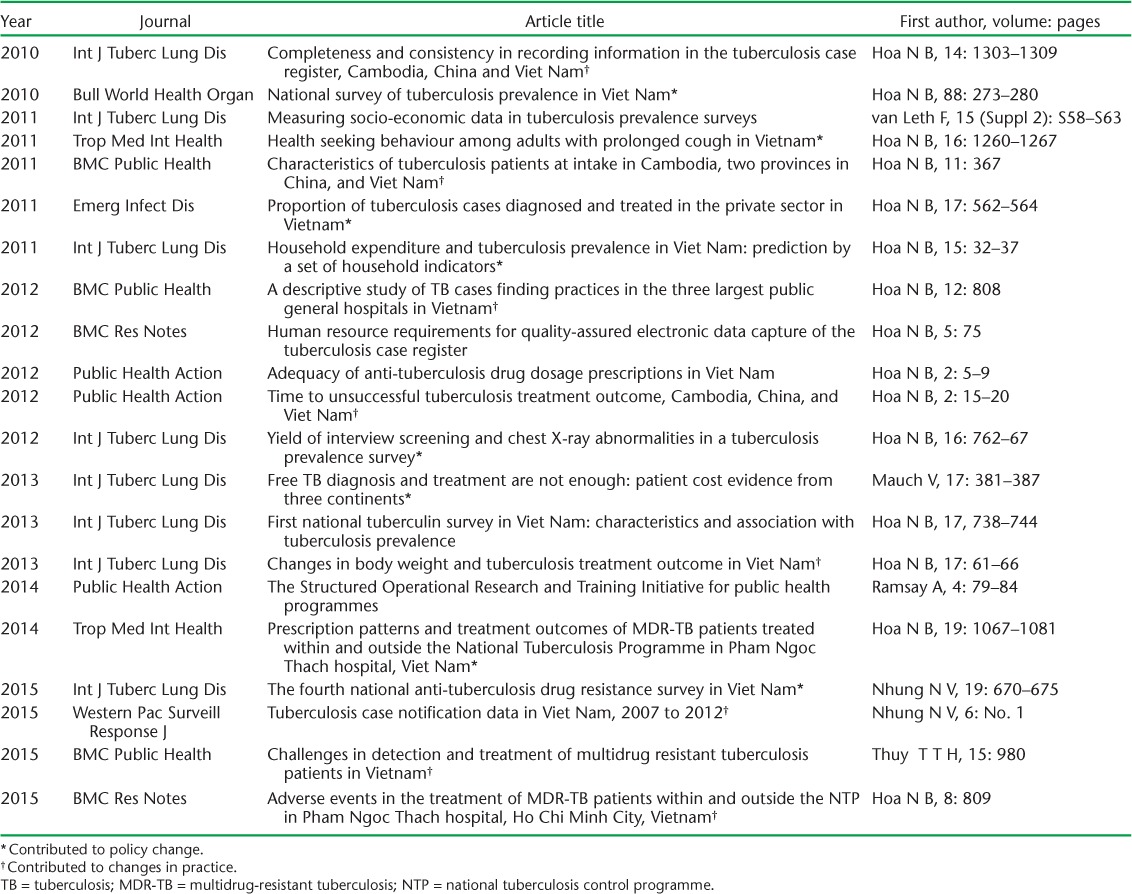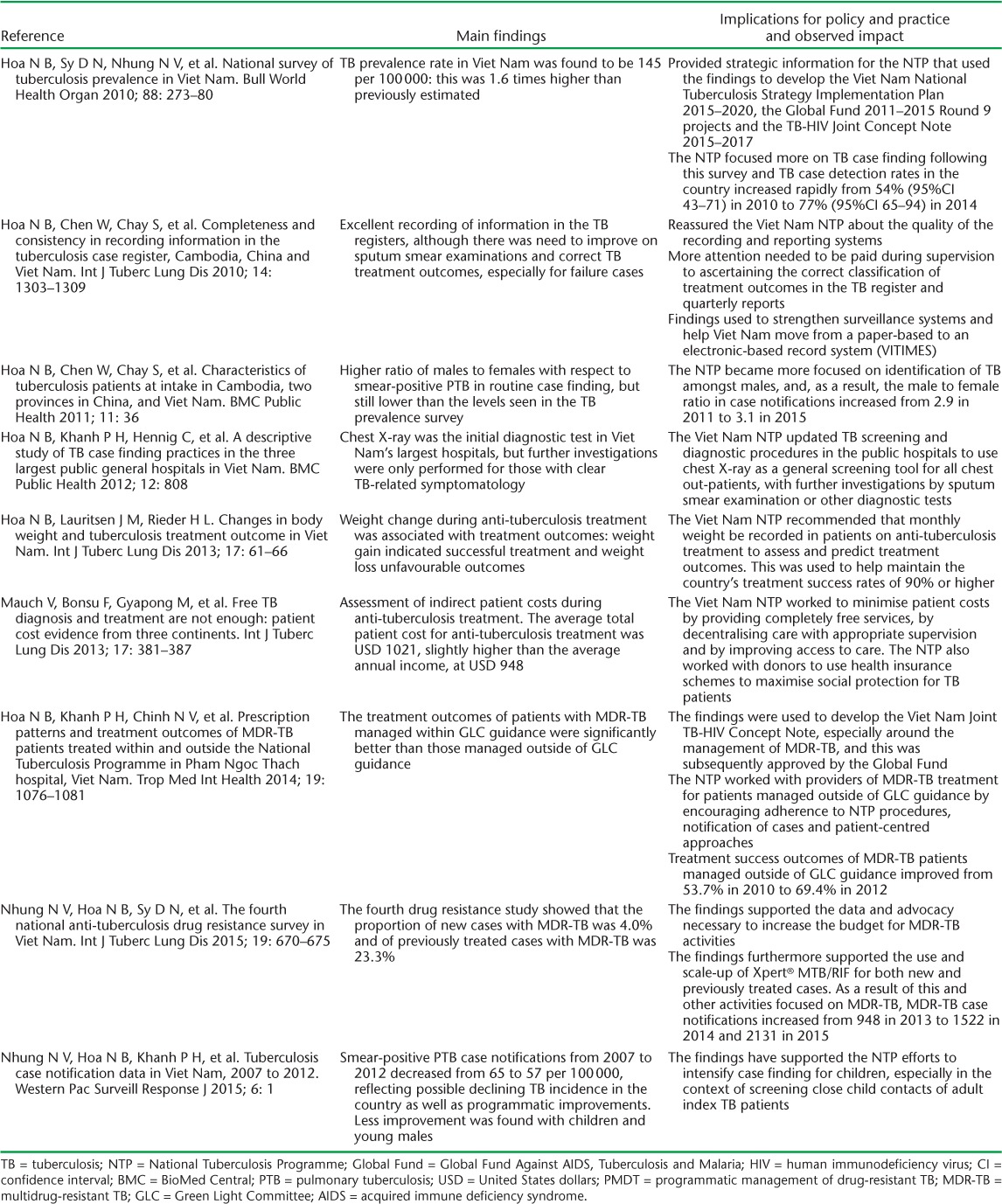Abstract
In April 2009, an operational research fellow was placed within the Viet Nam National Tuberculosis Control Programme (NTP). Over the 6 years from 2010 to 2015, the OR fellow co-authored 21 tuberculosis research papers (as principal author in 15 [71%]). This constituted 23% of the 91 tuberculosis papers published in Viet Nam during this period. Of the 21 published papers, 16 (76%) contributed to changes in policy (n = 8) and practice (n = 8), and these in turn improved programme performance. Many papers also contributed important evidence for better programme planning. Highly motivated OR fellows embedded within NTPs can facilitate high-quality research and research uptake.
Keywords: policy, practice, OR fellow, Viet Nam
Abstract
En avril 2009, un responsable de recherche opérationnelle (RO) a été placé au sein du Programme national de Lutte contre la Tuberculose (PNT) du Viet Nam. Au cours de 6 ans, de 2010 à 2015, ce responsable a été le co-auteur de 21 articles de recherche relative à la tuberculose (et comme auteur principal pour 15 articles [71%]), et ceci a constitué 23% des 91 articles publiés sur la tuberculose au Viet Nam pendant cette période. Sur les 21 articles publiés, 16 (76%) ont contribué à changer la politique (n = 8) et les pratiques (n = 8), et ceci à son tour a amélioré la performance du PNT. De nombreux articles ont également contribué dans une manière importante à une meilleure planification du PNT. Des responsables de RO très motivés incorporés au sein des PNT peuvent faciliter une recherche de qualité élevée et l'adoption de recherche.
Abstract
En abril del 2009 se asignó un becario en investigación operativa al Programa Nacional de Control de la Tuberculosis (PNT) de Viet Nam. Durante un período de 6 años, del 2010 al 2015, el becario fue coautor de 21 artículos de investigación sobre tuberculose (primer autor en 15 de ellos [71%]), que representaron el 23% de los 91 artículos publicados sobre el tema en Viet Nam durante este período. De los 21 artículos publicados, 16 (76%) contribuyeron a una modificación de las políticas (n = 8) y las prácticas (n = 8) y estas innovaciones mejoraron el desempeño del PNT. Muchos artículos aportaron además datos importantes para optimizar la planeación del PNT. La incorporación a los PNT de becarios en investigación operativa, muy motivados, favorece la realización de investigaciones de gran calidad y la aplicación práctica de sus resultados.
Operational research (OR) can be defined as research for knowledge on interventions, strategies or tools that enhance the quality, effectiveness or performance of health systems or programmes in which the research is being conducted.1,2 During the routine implementation of programme activities, many challenges arise that can be identified and resolved through OR with the aim of increasing efficiencies in health service delivery and improving health outcomes.1,3,4 In the recently launched World Health Organization (WHO) End TB Strategy, Pillar Three explicitly states the need for research to optimise implementation and impact.5
Viet Nam is a lower-middle-income country with a high tuberculosis (TB) burden. The country recognises the need for OR and the utilisation of research findings by decision makers, and it is expected that these should lead to positive development outcomes. Research is a key component in Viet Nam for providing strategic information for ending TB, and it has been included in Pillar Three of the Viet Nam National Tuberculosis Strategy Implementation Plan 2015–2020 (Ministry of Health, Hanoi, Viet Nam, July 2014).
In January 2009, with initial support from Bloomberg Philanthropies (New York, NY, USA) and later from the Department for International Development (London, UK), the International Union Against Tuberculosis and Lung Disease (The Union), based in Paris, France, established the Centre for Operational Research, with the principal objective of building OR capacity in low- and middle-income countries through the Structured Operational Research Training IniTiative (SORT IT) courses,6 and the placement of OR fellows within or close to programme settings. With the agreement of the director of the Viet Nam National Tuberculosis Programme (NTP), in April 2009 a part-time OR fellow, who had previously co-authored one published paper, was appointed within the NTP to promote and lead a relevant TB-specific OR agenda. The terms of reference included an obligation to submit at least two papers per annum to peer-reviewed journals.2,7
Six years later, we describe the output of OR conducted and published by the OR fellow in conjunction with the NTP and NTP colleagues, and outline how the research informed changes in policy and practice and improved programme performance.
ASPECT OF INTEREST
Published papers
Over the 6 years from January 2010 to December 2015, the Viet Nam OR fellow co-authored 21 TB-related research papers that were published in international journals (Table 1). This constituted 23% of the 91 TB research studies conducted in Viet Nam and published in international peer-reviewed journals (as indexed on Medline) with Vietnamese authors over the same time period. This contrasts with the 52 TB research papers published over the 6 years from 2004 to 2009. Of the 21 published papers, the OR fellow was first author of 15 (71%). Eleven (52%) papers were published in journals offering immediate open access, with the remainder offering open access after a period of time. In addition to these 21 papers, the OR fellow provided advice and suggestions and contributed to discussions for four other papers on which he was not a co-author.
TABLE 1.
Published research papers co-authored by the Viet Nam Operational Research fellow, January 2010–December 2015

Translation of research findings into policy and practice and observed impact
Once the research studies were completed, the findings were disseminated through national meetings, conferences and scientific publications, and were self-assessed as to whether they changed policy and practice and improved programme performance.
Of the 21 published papers, 16 (76%) contributed to changes in policy and practice (Table 1, with more detailed examples shown in Table 2). These were classified as 1) changes in policy (n = 8, 38%): changes in programmatic guidance using Xpert® MTB/RIF (Cepheid, Sunnyvale, CA, USA) to identify multidrug-resistant (MDR) TB in new TB cases; using chest radiography for active case finding in densely populated districts and in vulnerable and high-risk groups; providing instructions about how the NTP should collaborate with public and private health facilities; and modifying health insurance schemes to cover the costs of TB diagnosis; and 2) changes in practice (n = 8, 38%): better monitoring of weight change during treatment; improved focus on TB case finding among males, the poor and household child contacts; and improved diagnostic algorithms in patients with presumptive pulmonary TB using chest X-ray.
TABLE 2.
Examples of operational research studies on tuberculosis in Viet Nam between 2010 and 2015, the implications for policy and practice change and the observed impact

Many of the research findings were used for programme planning, to develop the Viet Nam National Tuberculosis Strategy Implementation Plan 2015–2020, the Global Fund Against AIDS, Tuberculosis and Malaria 2011–2015 Round 9 projects, and the TB-HIV Joint Concept Note 2015–2017.
DISCUSSION
This study shows the value of placing a motivated, driven and enthusiastic OR fellow within a disease control programme setting. The fellow was a co-author of between two and five published papers per annum from 2010 to 2015, he personally contributed to over one fifth of the total TB research publications from Viet Nam over the 6-year period, and assisted in a number of other TB-related papers for which he was not a co-author. Furthermore, publications on TB from Viet Nam increased by 75%, from 52 to 91, during that period compared with the previous 6 years. These findings are similar to experiences in India, and testify to a growing belief in the value of the OR fellowship model promoted and implemented by The Union in Asia and Africa.2
Over three quarters of the published papers on which the OR fellow was co-author contributed to changes in policy and practice, and many of these studies also added to the evidence base for planning within the NTP. This uptake of research is slightly higher than that observed from the OR capacity building SORT IT courses, where 74% of 88 studies and 55% of 81 studies were assessed as making a difference to policy and practice, respectively.8,9 The better research uptake is probably due to direct placement of the OR fellow within an NTP, as the research was highly relevant to programmatic needs, and national co-authorship was always prominent. This is similar to findings in the Malawi NTP 15 years previously.10 Based on the success of OR over the past few years, in September 2015 the Viet Nam Ministry of Health established the Viet Nam Integrated Centre for TB and Lung Disease Research (VICTORY) to lead in implementing and coordinating TB and lung disease research under the management of the National Lung Hospital in Hanoi and the Viet Nam NTP, thereby institutionalising research within a programme setting.
In conclusion, a motivated, well-supported and mentored OR fellow, embedded within the Viet Nam NTP under a performance-related contract, performed well and contributed to substantial TB research evidence generated between 2010 and 2015, which in turn contributed to changes in policy and practice and improved programme performance. During this time the OR fellow also assisted in supervising and mentoring other Vietnamese colleagues in the NTP, some of whom were attending SORT IT courses in Asia. As a capacity building strategy, the OR fellowship model deserves continued support.
Acknowledgments
The authors thank Bloomberg Philanthropies (New York, NY, USA) and the Department for International Development (London, UK) for financial support to the Centre for Operational Research, International Union Against Tuberculosis and Lung Disease, Paris, France. La Fondation Veuve Emile Metz-Tesch (Luxembourg) supported the open access publication costs. The funders had no role in study design, data collection and analysis, decision to publish, or preparation of the manuscript.
Footnotes
Conflicts of interest: none declared.
References
- 1.Zachariah R, Harries A D, Ishikawa N et al. Operational research in low-income countries: what, why, and how? Lancet Infect Dis. 2009;9:711–717. doi: 10.1016/S1473-3099(09)70229-4. [DOI] [PubMed] [Google Scholar]
- 2.Kumar A M V, Satyanarayana S, Dar Berger S et al. Promoting operational research through fellowships: a case study from the South-East Asia Union Office. Public Health Action. 2015;5:6–16. doi: 10.5588/pha.14.0111. [DOI] [PMC free article] [PubMed] [Google Scholar]
- 3.Zachariah R, Ford N, Maher D et al. Is operational research delivering the goods? The journey to success in low-income countries. Lancet Infect Dis. 2012;12:415–421. doi: 10.1016/S1473-3099(11)70309-7. [DOI] [PubMed] [Google Scholar]
- 4.Kumar A M V, Satyanarayana S, Wilson N, Zachariah R, Harries A D. Operational research capacity building in Asia: innovations, successes and challenges of a training course. Public Health Action. 2013;3:186–188. doi: 10.5588/pha.13.0008. [DOI] [PMC free article] [PubMed] [Google Scholar]
- 5.World Health Organization. Factsheet: The End TB strategy. Geneva, Switzerland: WHO; November 2015. http://www.who.int/tb/post2015_TBstrategy.pdf?ua=1 Accessed September 2016. [Google Scholar]
- 6.Ramsay A, Harries A D, Zachariah R et al. The Structured Operational Research and Training Initiative for public health programmes. Public Health Action. 2014;4:79–84. doi: 10.5588/pha.14.0011. [DOI] [PMC free article] [PubMed] [Google Scholar]
- 7.Harries A D, Rusen I D, Reid T et al. The Union and Médecins Sans Frontières approach to operational research. Int J Tuberc Lung Dis. 2011;15:144–154. [PubMed] [Google Scholar]
- 8.Zachariah R, Guillerm N, Berger S et al. Research to policy and practice change: is capacity building in operational research delivering the goods? Trop Med Int Health. 2014;19:1068–1075. doi: 10.1111/tmi.12343. [DOI] [PubMed] [Google Scholar]
- 9.Kumar A M V, Shewade H D, Tripathy J P et al. Does research through Structured Operational Research and Training (SORT IT) courses impact policy and practice? Public Health Action. 2016;6:44–49. doi: 10.5588/pha.15.0062. [DOI] [PMC free article] [PubMed] [Google Scholar]
- 10.World Health Organization. TB Research. Putting research into policy and practice: the experience of the Malawi National Tuberculosis Programme. Geneva, Switzerland: WHO; 1999. WHO/CDS/CPC/TB/99.268. [Google Scholar]


